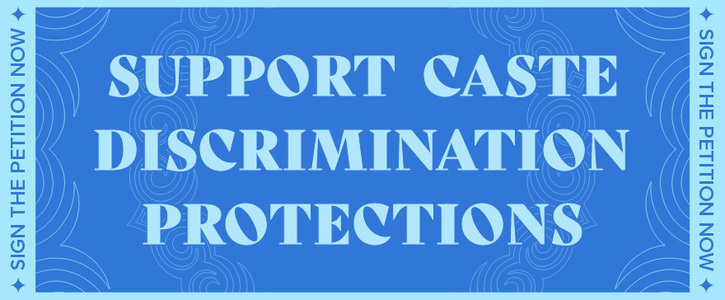5,000 signatures reached
To: Corporations
End #CasteInTech and #CasteInTheUS! Support Caste Discrimination Protections

All American institutions must join efforts to end #CasteintheUS by:
1. Utilizing the Ambedkar Principles to develop private sector protections for Dalit employees.
2. Supporting the addition of caste as a protected category in American civil rights laws, human rights commissions, and in their company policies.
3. Conducting audits of caste and religious bias in their organizations; implementing employee caste competency training and instating zero-tolerance policies for caste-based hostility in the workplace.
4. Investing in safer workplace environments, additional fellowships, and trainings for caste-oppressed employees to continue to be able to thrive and advance.
1. Utilizing the Ambedkar Principles to develop private sector protections for Dalit employees.
2. Supporting the addition of caste as a protected category in American civil rights laws, human rights commissions, and in their company policies.
3. Conducting audits of caste and religious bias in their organizations; implementing employee caste competency training and instating zero-tolerance policies for caste-based hostility in the workplace.
4. Investing in safer workplace environments, additional fellowships, and trainings for caste-oppressed employees to continue to be able to thrive and advance.
Why is this important?
As the United States faces a reckoning over its enduring racial caste system, a critical new front for civil rights was opened against the original system of caste that has its origins in South Asia. In June, California’s Department of Fair Employment and Housing launched a lawsuit against the tech company Cisco for caste-based discrimination toward an Indian American engineer, John Doe, who claims he was harassed by two co-workers and faced retaliation after complaining to the company.
This is not the first instance of caste discrimination in the U.S. and unfortunately won’t be the last. Equality Labs continues to receive first-hand responses from employees in tech, suggesting that the culture of discrimination against Dalits is prevalent and goes beyond the office to the caste networks in the institutions and communities where companies recruit.
“One engineer reported to Equality Labs that her department supervisor discovered she was part of the Valmiki Dalit caste whose members, called “manual scavengers,” were often forced to clean up excrement. Her supervisor shared this with her team and they started ridiculing her, going so far as to asking her to clean up after team meetings. She left that workplace after she was sexually harassed by one of her supervisors, which she also believes was targeted towards her in connection to the pervasiveness of the culture of caste-based sexual violence against Dalit women in India.” (Washington Post, Thenmozhi Soundararajan, July 2020)
“‘Higher’ caste Indians use the knowledge of a person’s caste to place him or her on the social hierarchy despite professional qualifications. I usually ignored these conversations,” another Dalit worker added. “If they knew I was Dalit, it could ruin my career.” (NYTimes, Yashica Dutt, July 2020)
Why is this important? Like race and gender protections, caste protections would provide accountability for instances of caste discrimination, which are not limited to Silicon Valley. Our 2018 Caste in the US report shows that a staggering 67 percent of Dalits in the Indian diaspora admitted to facing caste-based harassment at the workplace.
This is not the first instance of caste discrimination in the U.S. and unfortunately won’t be the last. Equality Labs continues to receive first-hand responses from employees in tech, suggesting that the culture of discrimination against Dalits is prevalent and goes beyond the office to the caste networks in the institutions and communities where companies recruit.
“One engineer reported to Equality Labs that her department supervisor discovered she was part of the Valmiki Dalit caste whose members, called “manual scavengers,” were often forced to clean up excrement. Her supervisor shared this with her team and they started ridiculing her, going so far as to asking her to clean up after team meetings. She left that workplace after she was sexually harassed by one of her supervisors, which she also believes was targeted towards her in connection to the pervasiveness of the culture of caste-based sexual violence against Dalit women in India.” (Washington Post, Thenmozhi Soundararajan, July 2020)
“‘Higher’ caste Indians use the knowledge of a person’s caste to place him or her on the social hierarchy despite professional qualifications. I usually ignored these conversations,” another Dalit worker added. “If they knew I was Dalit, it could ruin my career.” (NYTimes, Yashica Dutt, July 2020)
Why is this important? Like race and gender protections, caste protections would provide accountability for instances of caste discrimination, which are not limited to Silicon Valley. Our 2018 Caste in the US report shows that a staggering 67 percent of Dalits in the Indian diaspora admitted to facing caste-based harassment at the workplace.
How it will be delivered
Press Conference
